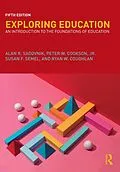This much-anticipated fifth edition of Exploring Education offers an alternative to traditional foundations texts by combining a point-of-view analysis with primary source readings. Pre- and in-service teachers will find a solid introduction to the foundations disciplines -- history, philosophy, politics, and sociology of education -- and their application to educational issues, including school organization and teaching, curriculum and pedagogic practices, education and inequality, and school reform and improvement. This edition features substantive updates, including additions to the discussion of neo-liberal educational policy, recent debates about teacher diversity, updated data and research, and new selections of historical and contemporary readings.
At a time when foundations of education are marginalized in many teacher education programs and teacher education reform pushes scripted approaches to curriculum and instruction, Exploring Education helps teachers to think critically about the "what" and "why" behind the most pressing issues in contemporary education.
Autorentext
Alan R. Sadovnik is Board of Governors Distinguised Service Professor of Education, Sociology, and Public Administration and Affairs at Rutgers University-Newark, USA.
Peter W. Cookson, Jr. is a Senior Researcher at the Learning Policy Institute Palo Alto California and Washington DC, and teaches in the Sociology Department at Georgetown University, USA.
Susan F. Semel is Professor of Education at the City College of New York, USA and Professor of Urban Education at the City University of New York Graduate Center, USA.
Ryan W. Coughlan is Assistant Professor of Sociology at Guttman Community College, CUNY, USA.
Zusammenfassung
This much-anticipated fifth edition of Exploring Education offers an alternative to traditional foundations texts by combining a point-of-view analysis with primary source readings. Pre- and in-service teachers will find a solid introduction to the foundations disciplines -- history, philosophy, politics, and sociology of education -- and their application to educational issues, including school organization and teaching, curriculum and pedagogic practices, education and inequality, and school reform and improvement. This edition features substantive updates, including additions to the discussion of neo-liberal educational policy, recent debates about teacher diversity, updated data and research, and new selections of historical and contemporary readings. At a time when foundations of education are marginalized in many teacher education programs and teacher education reform pushes scripted approaches to curriculum and instruction, Exploring Education helps teachers to think critically about the "what" and "why" behind the most pressing issues in contemporary education.
Inhalt
Contents
Preface
Acknowledgments
1 The Limits and Promises of Education: Toward Reflective Practitioners
Educational Problems
The Achievement Gaps
The Crisis in Urban Education
The Decline of Literacy
Assessment Issues
Understanding Education: The Foundations Perspective
The History of Education
The Philosophy of Education
The Politics of Education
The Sociology of Education
The Foundations Perspective: A Multidisciplinary and Interdisciplinary Approach
Critical Literacy and Empowerment: Toward the Active Voice of Teachers
2 The Politics of Education: Conservative, Liberal, Radical, and
Neo-liberal Perspectives
The Purposes of Schooling
Political Perspectives
General Issues: Conservative, Liberal, Radical, and Neo-liberal Perspectives
Traditional and Progressive Visions of Education
The Role of the School
Explanations of Unequal Educational Performance
Definition of Educational Problems
Educational Policy and Reform
Education and the American Dream
The Neo-liberal Perspective
From Political Perspectives to the Politics of Education
Evidence Use and the Core Curriculum Standards Movement: From Problem Definition to Policy Adoption, Lorraine McDonnell and M. Stephen Weatherford
What "Counts" as Educational Policy? Notes Toward a New Paradigm, Jean Anyon
3 The History of Education
Old World and New World Education: The Colonial Era
The Age of Reform: The Rise of the Common School
Opposition to Public Education
Education for Women and African-Americans
Urbanization and the Progressive Impetus
Education for All: The Emergence of the Public High School
The Post-World War II Equity Era: 1945-1980
Cycles of Reform: Progressive and Traditional
Equality of Opportunity
Educational Reaction and Reform and the Standards Era: 1980s-2012
Understanding the History of U.S. Education: Different Historical Interpretations
The Democratic-Liberal School
The Radical-Revisionist School
Conservative Perspectives
Conclusion
Empowerment and Education: Civil Rights, Expert Advocates, and Parent
Politics in Head Start, 1964-1980, Josh Kagan
Capital Accumulation, Class Conflict, and Educational Change, Samuel
Bowles and Herbert Gintis
4 The Sociology of Education
The Uses of Sociology for Teachers
The Relation between School and Society
Theoretical Perspectives
Functional Theories
Conflict Theories
Interactional Theories
Effects of Schooling on Individuals
Knowledge and Attitudes
Employment
Education and Mobility
Inside the Schools
Teacher Behavior
Student Peer Groups and Alienation
Education and Inequality
Inadequate Schools
Tracking
De Facto Segregation
Gender
Sociology and the Current Educational Crisis
The School Class as a Social System Some of Its Functions in
American Society, Talcott Parsons
On Understanding the Processes of Schooling: The Contributions of
Labeling Theory, Ray C. Rist
The Politics of Culture: Understanding Local Political Resistance to
Detracking in Racially Mixed Schools, Amy Stuart Wells and Irene Serna
5 The Philosophy of Education and Its Significance for Teachers
The Perspective of Philosophy of Education
What Is Philosophy of Education?
The Meaning of Philosophical Inquiry
Particular Philosophies of Education
Idealism
Realism
Pragmatism
Existentialism and Phenomenology
Neo-Marxism
Postmodernist and Critical Theory
Conclusion
My Pedagogic Creed, John Dewey
Wide-Awakeness and the Moral Life, Maxine Greene
6 Schools as Organizations and Teacher Professionalization
The Structure of U.S. Education
Governance
Size and Degree of Centralization
Student Composition
Degree of "Openness"
Private Schools
Conclusion
International Comparisons
Great Britain
France
Japan
Germany
Finland
Conclusion
School Processes and School Cultures
Teachers, Teaching, and Professionalization
Who Becomes a Teacher?
The Nature of Teaching
Underqualified Teachers
Teacher Professionalization
Rich Land, Poor Schools: Inequality of National Educational Resources
and Achievement of Disadvantaged Students, David Baker and Gerald LeTendre, with Brian Goesling
What Do the National Data Tell Us About Minority Teacher Shortages,
Richard Ingersoll
7 Curriculum, Pedagogy, and the Transmission of Knowledge
What Do the Schools …
